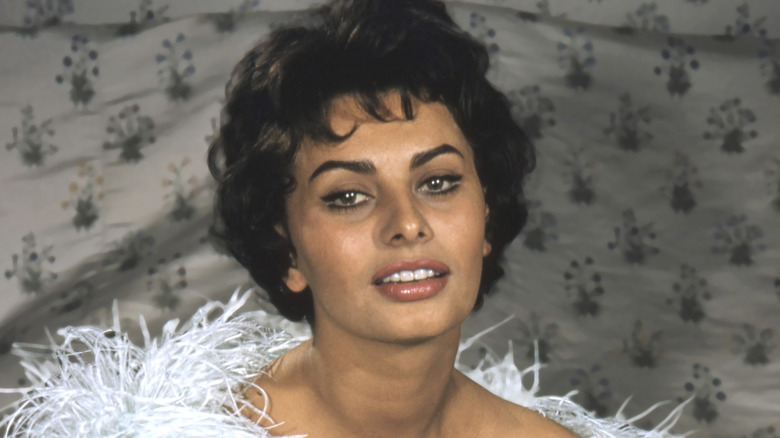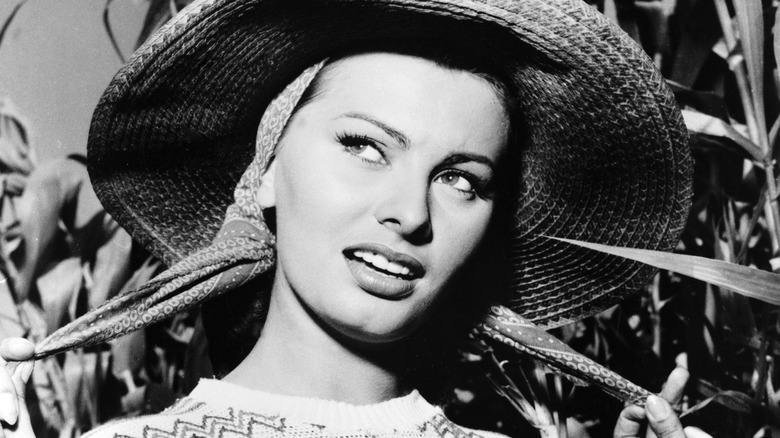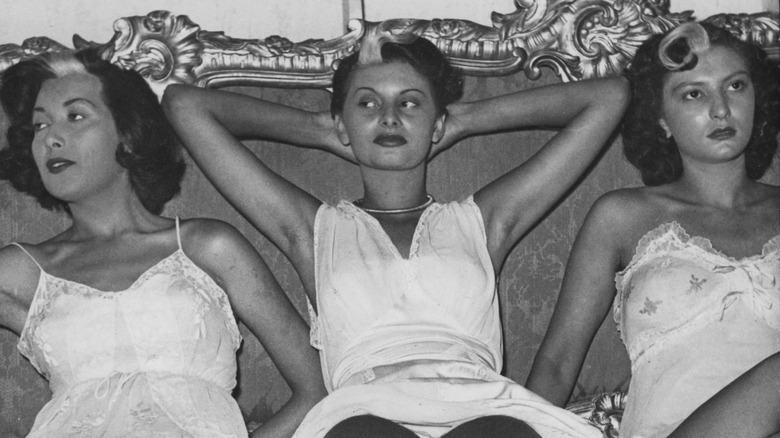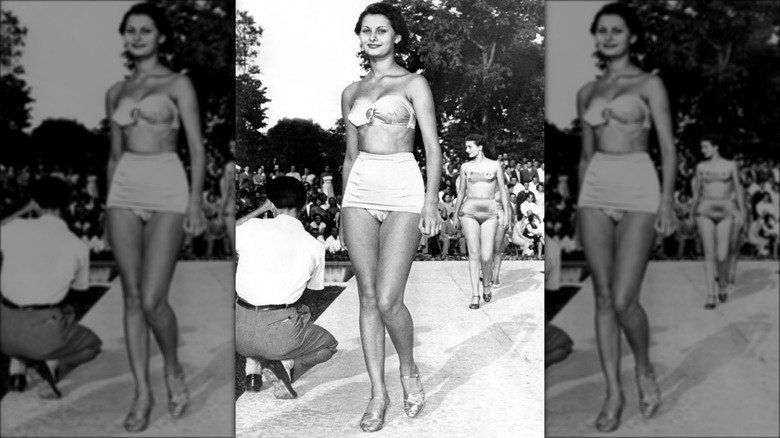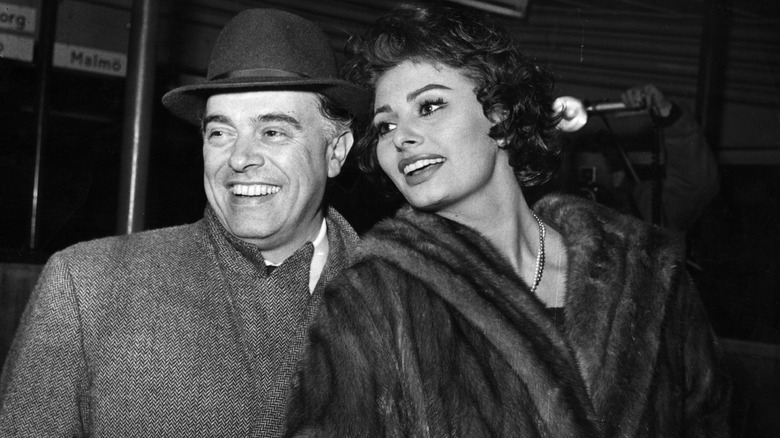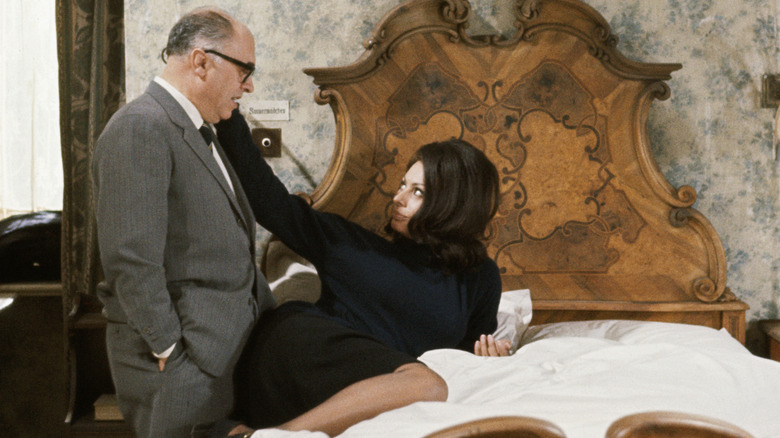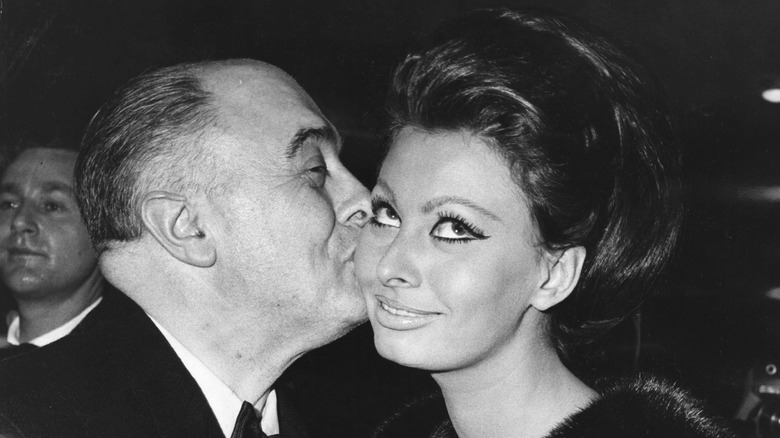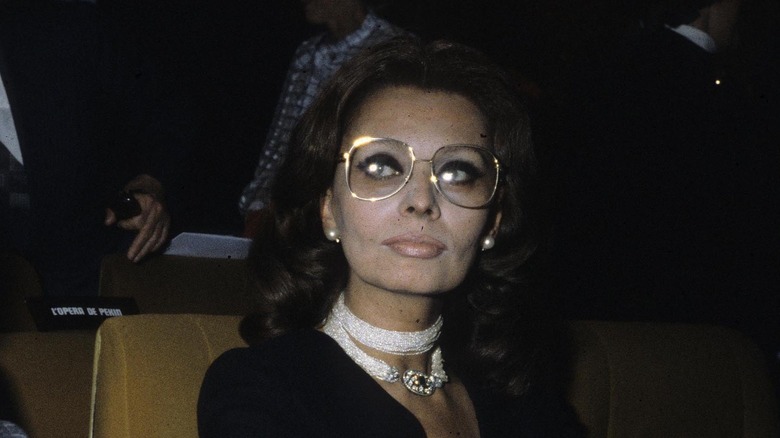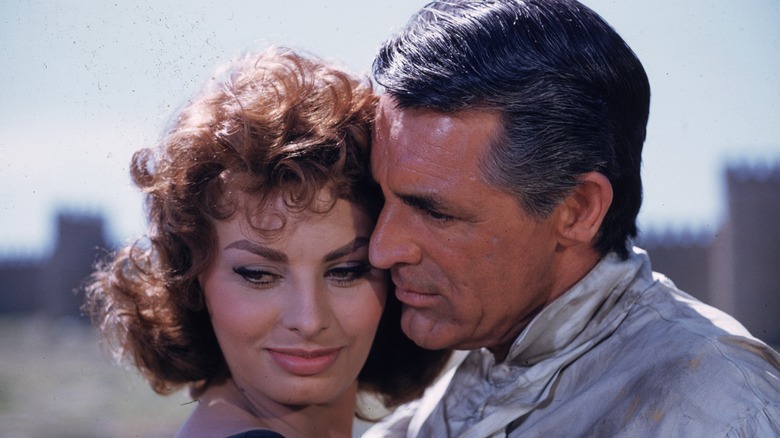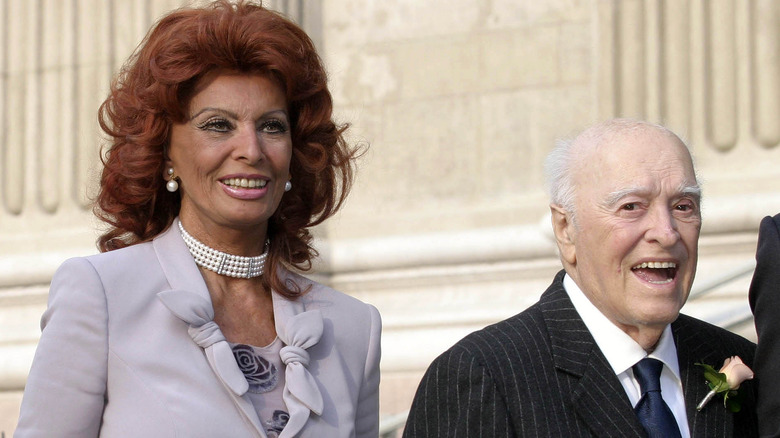Tragic Details About Sophia Loren
We may receive a commission on purchases made from links.
Had TikTok been around in the 1960s, there's no doubt that everyone's search history would have been filled with the keyword "Sophia Loren." Even today, as of this writing, #SophiaLoren has a staggering 194.7 million views on TikTok — a representation of the Italian megastar's lasting impression on popular culture. When Loren first stepped on the scene, audiences were immediately entranced by her sultry beauty, massive talent, and perhaps most of all, captivating hazel eyes set with her signature, smoky eyeliner.
These days, Loren is taking things easy in comparison to her decades-long career, and she doesn't have much to complain about. "In life, you always go through so many experiences, but I have always tried to live with no regrets," she told Radio Times in 2020. "I think I've reached a peaceful life. I have everything I ever wanted, which is a wonderful family with beautiful children and beautiful grandchildren." But if she were to name one thing she wishes she would have done differently, that would be not getting married in a white dress, which is a desire she still holds on to.
As happy as Loren is with the way her life worked out, things weren't always glamorous for the actor. She did not come from wealth — quite the opposite, actually — and though she was only married once, her 50-year marriage to Carlo Ponti had its fair share of ups and downs.
Sophia Loren was born into poverty
Sophia Loren was born Sofia Scicolone in 1934 in the charity ward of a clinic for unwed mothers in Rome. Her mother, Romilda Villani, was a beautiful aspiring actor who was often likened to Greta Garbo, while her father, Riccardo Scicolone, was an engineering assistant for a railway. The two knew each other for only a few short weeks before Villani became pregnant. When she refused to get an abortion, Scicolone fled and didn't see Villani again until after Sophia was born, upon receiving threats and legal pressure from Villani's mother. Scicolone began working on a commission-based salary for a publisher of fascist propaganda — where he earned little to no money. Villani developed health problems; thus, she was unable to work.
In their dire situation, Scicolone couldn't bear to be involved, so he deserted Villani and Sophia once again. Villani decided to move back home with her parents. Soon, the onset of World War II started, and the family's money struggles deepened. Their town of Pozzuoli was reportedly declared the poorest in all of Italy, while famine struck the nation. Things got so bad that even water was hard to come by, and Villani, who had given birth to another daughter fathered by Scicolone, was forced to give her children water salvaged from the car radiator. Because Scicolone refused to accept Maria, the pair's second child together, as his own, Villani was on her own financially. She begged for money and food on the streets, and for eight months, the three lived in nothing more than a nearby tunnel.
Her wet nurse said she was the 'ugliest child' she'd ever seen
Even before the war, Sophia Loren's mother struggled physically and financially. Right after Sophia was born, Romilda Villani and Riccardo Scicolone lived together for a brief time, but Scicolone's pay was barely enough to get by. Villani pressured him to marry her, but he refused and would not budge. She began having stomach problems, and in turn, her milk supply for Sophia quickly diminished, and Sophia was left malnourished and comparable to skin and bones. Moreover, according to "Sophia Loren: A Biography," she was considered an unconventional baby, with large eyes and a large nose. Scicolone left, and Villani took her baby to Rome in hopes of trying to make it as an actor. In Rome, her landlady took care of Sophia while she went out and looked for work.
In an attempt to nurse a malnourished Sophia to health, the landlady would feed the baby a puree of tomatoes and stewed lentils, which ended up leading to a severe fever. Sophia was taken to the clinic where she was born, and the doctor informed Villani that Sophia would survive if she was given regular feedings of breast milk. This news was terrifying to Villani, who was unable to nurse her child. Her only option was to hire a wet nurse.
The wet nurse, Zaranella, demanded high payments and meat in exchange for her services, so the Villani's gave up their meat supply for Sophia to eat. Years later, after Sophia Loren became famous, Zaranella reported to the press that Loren was the "ugliest child" she had ever seen.
Sophia Loren was wounded during WWII
As a young child, Sophia Loren was often teased for being so skinny — the other children would call her "toothpick" — as well as for being illegitimate. "The children at school all had families with a father," Loren told the Independent in 2021. "I wouldn't say I was envious, because I loved my friends very much, but I was not like them. I felt different ... But it didn't make us any less of a family because my mother was not married." She continued, "Maybe it made us more of a family, because we bonded over the fact that we were not like the others."
Around this time, Loren, her sister, and their mother were living in Pozzuoli, which was one of the worst places to be during the war years. Pozzuoli was home to a harbor and a munitions plant — both frequently targeted with bombs. In fact, young Loren was so close to a raid on the town one day, she was struck in the chin by fragments of a bomb. Fortunately, she was able to run to shelter, but the injury left a lasting scar on her chin. However, times weren't all bad. Loren's grandmother opened up a pub in her living room as a means to support the family, which led to American and British troops frequenting the house. They taught Loren English words and phrases, showed her popular American dances, and even gave her her first chocolate bar — something she'd never seen before.
Her early years with Carlo Ponti were considerably rocky
Although Sophia Loren was a homely child, she began to grow out of her awkward phase in her early teen years; so much so, in fact, that her mother came to recognize what a true beauty her daughter was. She enrolled Loren in beauty pageants, and in 1951, when Loren was 17, she caught the eye of one of the judges. Carlo Ponti was a famous producer in Italy (who was also 22 years older than Loren) and married, albeit separated from his wife. The two took a liking to each other, and began dating.
Ponti saw Loren's talent from the beginning, so he started helping her pursue movies. One day, while Loren was being photographed for a screen test, the cameraman yelled out, "She's impossible to photograph. Her face is too short, her mouth is too big, her nose is too long" (via the New York Post). Instead of standing up for Loren, Ponti chimed in and sided with the photographer. In her 2014 memoir, "Yesterday, Today, Tomorrow: My Life," Loren remembers Ponti alluding to her that she should consider getting a nose job. "Sophia, have you ever thought about ... softening your ... dominant profile?" he asked.
Loren's response? "Carlo, if you're suggesting that to be able to make movies I'm going to have to slice off a piece of my nose, well then I'm going back to Pozzuoli because I have no intention of getting a nose job." Aside from all this, Ponti and Loren's romance caused an uproar in the media due to Ponti's unofficial separation from his wife.
Sofia Loren and Carlo Ponti had to live in exile
As it turns out, Sophia Loren wasn't the first young woman Carlo Ponti locked focus on. Before meeting Loren, Ponti was responsible for discovering now-famous Italian actress Gina Lollobrigida, who is often noted as Loren's career rival, at a beauty pageant. Ponti helped Lollobrigida score at least 20 film roles, and it is said that he helped other women make it into the movie business as well. But because Loren grew up without a father figure, she was often attracted to older men — ones who could fill the void of Riccardo Scicolone. Ponti took on the authority of a dominant male figure in Loren's life; he told her how to dress, how to speak, what to read, and mainly, how to capture the attention of Hollywood. In essence, Ponti groomed Loren both in looks and her career.
Loren's desire for a father-figure and Ponti's eye for success made the pair a perfect match, and the two made the decision to get married. However, there was one major problem: The Roman Catholic Church refused to legally recognize Ponti's divorce from his previous wife. This meant that Loren and Ponti had to be married by proxy in Mexico, and when the church found out, Ponti was charged with bigamy. The lovers lived in secrecy and in exile until they became French citizens and married once again in Paris in 1966.
She had to endure her husband's brushes with the law
Before Carlo Ponti met and married Sophia Loren, he was the subject of numerous controversies within his career as a producer. During WWII, he was imprisoned in Italy by fascist authorities for his work on "Piccolo Mondo Antico," a 1941 film that was seen as "anti-German." Even after reciting his vows to Loren, Ponti continued to find himself in trouble with the law. In 1973, five years after legally marrying Loren, he was charged once again for producing a movie — this time for "Massacre in Rome." "Massacre in Rome" depicted Pope Pius XII in unflattering ways, particularly by claiming that he did not interject when Germans were executing Italian hostages during the war. Ultimately, the charges were appealed and dropped.
In 1981, Carlo Ponti, along with two business partners, was charged with fraud by the Securities and Exchange Commission. The commission filed a lawsuit against Ponti under claims that he and his partners had misled and defrauded approximately 47-58 film investors, along with forging falsified documents depicting loans that had been received for filmmaking. After the ruling, which prevented violations like this from happening in the future, the Italian government was allowed to take full possession of Ponti and Loren's extensive fine art collection. The collection featured somewhere near $6.7 million worth of art from famed artists around the globe, which was originally confiscated from Loren when she attempted to take some of the pieces out of Italy. Ponti and Loren were not able to reclaim the art until the late '80s, when Ponti's legal troubles were finally settled in court.
Sofia Loren was imprisoned for tax evasion
In the early 1960s, when Sophia Loren's career was just blossoming and she was becoming a household name, learning how to handle her newfound fortune was undoubtedly a whole new world. To take care of her taxes, Loren hired a tax professional and assumed all was well, that is, until nearly 20 years later in 1980. That year, according to The Washington Post, Loren was faced with charges of tax evasion for failing to pay $180,000 on her 1963 tax return, which is closer to $2 million today. The tax professional she hired had since died, so Loren was alone to face the miscalculated return.
"I am not a crook," Loren insisted to The Washington Post reporters in 1982 as she was on her way to an Italian jailhouse (fashionably dressed, of course) to complete her 30-day sentencing. As good as she looked on the outside, what she was feeling on the inside was quite a different matter. "I am worried, very worried about this month that awaits me in jail," she confessed as reporters followed her to the doors. She announced that she felt this was not a fair ruling, but even a pardon request sent to the Italian president had gone unanswered.
Fans and inmates cheered for Loren as she entered the prison, and many held up posters with her picture that read, "Pardon Sophia." Though she was sentenced to 30 days in jail, Loren ended up only serving 17.
She had to deny Cary Grant's romantic advancements to avoid scandal
In 1957, while Sophia Loren was engaged to Carlo Ponti, she met Cary Grant on the set of "The Pride and the Passion." Young Loren was charmed by Grant's sense of humor, affectionate ways, his life experience, and wisdom as an actor. "It was hard to resist the magnetism of a man like Cary, who said he was willing to give up everything for me," Loren recalled in her memoir, "Yesterday, Today, Tomorrow." "On our last night, he invited me out, looking more solemn than usual." She continued, "There was a gorgeous sunset outside as he turned to me, looked me in the eyes and said simply: 'Will you marry me?'"
As much affection as Loren had for Grant, there was no question what she was going to do. "That would have meant my leaving Carlo and creating a huge scandal," she told The Sydney Morning Herald in 2019 regarding Cary Grant's proposal. "The American press had been very cruel to Ingrid Bergman when she left her husband and I was terribly afraid of what the reaction would have been if I had left Italy." Moreover, Loren's son, Eduardo Ponti, reported to The Guardian that Loren chose Ponti because he was everything familiar to her. "My mother has always been very close to her roots," he shared. "Her roots run very deep. So I do understand the choice of going back to my father, because he represented everything she knew, the country she loved. He was a man whose emotional language she understood."
She never forgave her father or recovered from Carlo Ponti's death
All in all, Sophia met her father a total of three times throughout her life — once when she was five, 17, and in 1976 when he was on his deathbed. "I never had a relationship with my father," Loren explained to The Irish Times in 2020. "I wish he would have been a different person, a different father, and different companion for my mother but he was who he was and you don't get to choose your parents. I was lucky though to have a great mother who loved both me and my sister with all her heart."
Though Loren has never forgotten the absence of her father in her life, her relationship with Carlo Ponti was one that possibly made up for it. "What Carlo gave me were the tools to believe in myself," she told The Irish Times. "He showed me that I could make my dreams come true. We were partners in love, in family, and in work. I don't want to think of my life without him in it."
Unfortunately, Ponti died in 2007 at the age of 94 — with Loren right by his side. Since then, she has struggled to move on from the death of the man she was married to for 50 years. "I was very sad when my husband died, because you can never get over this kind of feeling," she disclosed to AARP. "Never. Each time you think about it, there's a moment of the loneliness, which is very strong, but that's life."

